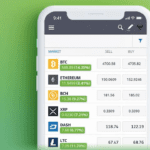In an era where digitization reigns supreme, the European banking landscape has not been left untouched. The Old Continent, steeped in history and rich in tradition, has experienced a dramatic shift in how banking is done. No longer limited to the grandiose facades of stone-clad buildings, modern banking in Europe now thrives in the virtual realm, making financial transactions as easy as a few taps on a smartphone.
Choosing the right online bank is more than just about finding the lowest fees or the most innovative app. It’s about aligning with an institution that understands your needs, offers top-tier security, and provides services tailored to the unique demands of the European market. As we dive deep into the realm of online banking in Europe, we will explore the best players in the game, breaking down their features, fee structures, and standout services, ensuring that you, the reader, are equipped with all the information needed to make an informed decision. Whether you’re a seasoned investor, an expat looking to manage finances across borders, or someone simply seeking a more efficient way to handle daily transactions, this guide is for you.
The Rise of Online Banking in Europe
Online banking, often dubbed as the future of financial transactions, has seen significant growth across Europe. This ascent can be attributed to various factors, from historical events to technological innovations and changing consumer behavior. Let’s delve into the intricacies of these developments to understand the trajectory of online banking in Europe.
Historical backdrop
The genesis of online banking in Europe can be traced back to the late 20th century. With the advent of the internet, several European banks began experimenting with electronic banking platforms, albeit in their nascent stages. Early adopters faced skepticism due to concerns about security and the unfamiliarity of transacting without physical interactions.
Join the world's biggest trading network & get instant access to a personal account manager!
The European Union played a pivotal role in streamlining and encouraging cross-border financial transactions, fostering an environment ripe for online banking. Initiatives like the Single Euro Payments Area (SEPA) laid the foundation for standardized banking across member states. Moreover, the economic crises of the early 21st century prompted many to seek alternative banking solutions, further fueling the rise of online banking platforms that offered transparency, efficiency, and minimal overheads.
Technological advancements propelling online banks
Technological innovations have been at the heart of online banking’s rapid growth. As high-speed internet became ubiquitous, and smartphones turned from luxury to necessity, the stage was set for a banking revolution.
Fintech startups, leveraging cutting-edge technologies such as Artificial Intelligence, blockchain, and advanced data analytics, began to challenge traditional banking norms. These platforms provided intuitive user interfaces, real-time transaction updates, and personalized financial insights, features that were once unthinkable in traditional banking. Furthermore, the introduction of open banking regulations in Europe, spurred by the Revised Payment Service Directive (PSD2), allowed third-party developers to create applications and services around financial institutions, fostering innovation and competition in the banking sector.
Changing consumer preferences and trust
The psyche of the European consumer has evolved considerably over the past few decades. With increased exposure to global trends and a growing emphasis on convenience, there’s been a noticeable shift towards digital solutions. Online shopping, digital payments, and e-wallets became part of everyday life, setting the stage for online banks to flourish.
Trust, once a significant barrier to online banking adoption, has seen a transformation. Enhanced security protocols, two-factor authentication, and end-to-end encryption became standard, assuaging many of the initial concerns. Moreover, as younger generations, who are more tech-savvy and open to digital innovations, became a significant segment of the banking population, the trust in and adoption of online banking solutions surged. The transparency offered by many online banks, with clear fee structures and real-time transaction details, further cemented consumer trust and loyalty.
In essence, the rise of online banking in Europe is a confluence of historical events, technological innovations, and evolving consumer preferences. As we continue to witness its expansion, it’s evident that online banking is not just a trend but a testament to Europe’s adaptive and forward-thinking financial landscape.
Criteria for Evaluating Online Banks
In the vast and growing landscape of online banking, selecting the right institution is crucial. The sheer number of options available can be overwhelming. However, by focusing on key criteria, individuals and businesses alike can narrow down their choices and select an online bank that best suits their needs. Here, we’ll delve into the core criteria that should be at the forefront of any decision-making process related to online banking.
Security measures and reliability
At the heart of any financial institution must be an unwavering commitment to security. Online banks, devoid of physical branches, must place an even higher emphasis on digital safeguards.
- Encryption: Ensure that the bank employs robust encryption protocols to protect data transmission.
- Two-factor authentication (2FA): This adds an extra layer of security, ensuring that even if someone knows your password, they can’t access your account without a second verification step.
- Fraud monitoring and alerts: Proactive monitoring of suspicious activities can prevent unauthorized transactions.
- Regulatory compliance: Ensure that the online bank adheres to local and international security standards and regulations.
Fee structures
Transparency and fairness in fee structures are paramount. While many online banks tout “no fees” as a selling point, it’s essential to delve deeper.
- Monthly fees: Some online banks might charge a monthly maintenance fee.
- Transaction fees: Look for costs associated with transfers, withdrawals, or currency conversions.
- Overdraft and loan rates: If the bank offers credit facilities, what are the associated costs?
- Hidden fees: Always read the fine print to ensure there are no unexpected charges.
Range of services offered
An online bank’s value is not just in its digital interface but in the breadth of its offerings.
- Account types: From savings and checking accounts to business and joint accounts, variety matters.
- Investment services: Some online banks provide investment platforms, robo-advisors, or partnerships with brokerage firms.
- Loans and credit: Availability of personal loans, mortgages, or credit lines can be a significant advantage.
- Currency and international services: For those who travel or do business internationally, multi-currency accounts and favorable foreign exchange rates can be pivotal.
User experience and digital interfaces
In the digital realm, the user experience can make or break an online bank.
- Intuitive design: The platform should be easy to navigate, with clear instructions and a seamless flow.
- Mobile app: A robust and feature-rich mobile application is essential in today’s smartphone-dominated world.
- Personalized insights: Tools that offer financial insights, budgeting, and spending trackers enhance user engagement.
- Speed: Fast loading times and real-time updates can significantly improve the overall experience.
Customer support and responsiveness
The absence of physical branches places a higher onus on online banks to provide impeccable customer support.
- Multiple channels: Availability through chat, email, phone, and even social media ensures accessibility.
- Response time: Swift and efficient responses to queries or issues are critical.
- Knowledgeable staff: Customer support representatives should be well-trained and capable of addressing a wide range of concerns.
- Availability: 24/7 support can be a significant advantage, especially for those in different time zones or with unpredictable schedules.
In conclusion, while the allure of online banking lies in its convenience and innovation, potential users must approach their choices with a discerning eye. By evaluating online banks based on the criteria mentioned above, one can ensure a safe, cost-effective, and enriching banking experience.
Top Online Banks in Europe: An In-depth Look
Online banking has surged in popularity across Europe, with several players standing out due to their exceptional service, competitive fee structures, and innovative features. Let’s explore some of the leading online banks in the European arena.
N26: Features, fees, and standout services
N26, a German-based neobank, has swiftly gained traction across Europe, offering services in various countries.
- Features: The bank is known for its real-time push notifications on transactions, Spaces (sub-accounts for organizing funds), and a clear-cut mobile interface.
- Fees: N26 operates a tiered membership model with a basic free account, and then premium accounts with monthly fees that come with added benefits, including insurance packages and no foreign transaction fees.
- Standout services: Their partnership with TransferWise ensures favorable exchange rates for international transfers. The bank also boasts extensive ATM withdrawal benefits for its premium users.
Revolut: Features, fees, and standout services
Founded in the UK, Revolut has extended its services across Europe, offering a wide array of banking and financial features.
- Features: Apart from standard banking features, Revolut offers cryptocurrency exchanges, stock trading, and commodities trading.
- Fees: Revolut’s basic account is free, but they have premium tiers with added benefits, much like N26. However, the bank may charge small fees for certain services like international transfers and ATM withdrawals beyond a set limit.
- Standout services: One of Revolut’s most notable features is its robust analytics that categorize and graph your spending, helping users manage their finances better.
Monzo: Features, fees, and standout services
Initially a UK exclusive, Monzo has begun expanding its footprint into the broader European market.
- Features: Monzo offers features such as Pots (akin to N26’s Spaces) to set money aside, bill splitting, and salary sorter to automate the division of your salary among different pots or expenses.
- Fees: Monzo does have a free account option, but also offers Monzo Plus and Monzo Premium tiers which come with monthly fees and added benefits.
- Standout services: Monzo’s “Get Paid Early” feature allows users to access their salary a day earlier than their official payday.
Bunq: Features, fees, and standout services
Originating from the Netherlands, Bunq has positioned itself as an ethical and user-driven online bank.
- Features: Bunq offers up to 25 individual IBAN accounts, auto-saving features, and a “Tree Planting” feature where they plant a tree for every €100 spent using a Bunq card.
- Fees: Unlike other banks, Bunq doesn’t offer a free tier. They have various premium plans with a range of services.
- Standout services: Bunq’s focus on green and sustainable banking makes it unique. The “Freedom of Choice” feature allows users to decide how their money gets stored.
This analysis provides a snapshot of just a few leading online banks in Europe. Each of these banks offers a unique proposition, catering to different needs and preferences. As the digital banking space continues to evolve, consumers have a plethora of choices, ensuring that there’s a fit for every financial need and preference.
The Advantages of Banking Online in Europe
The surge in online banking’s popularity across Europe is not merely coincidental. Digital banks have consistently presented myriad advantages over traditional brick-and-mortar institutions. As the European Union fosters an integrated financial landscape, online banks have risen to the occasion, tailoring their services to meet the continent’s unique needs. Here, we explore some of the compelling advantages of banking online in Europe.
Convenience and accessibility
One of the most evident benefits of online banking is the unparalleled convenience it offers.
- Anywhere, Anytime: Whether you’re in the bustling streets of Paris or the serene coasts of Greece, your bank is just a few taps away on your smartphone or computer. You can perform transactions, check balances, and manage accounts 24/7 without setting foot in a branch.
- Instant Account Set-Up: Many online banks in Europe offer near-instant account set-ups, allowing users to open an account in just a few minutes, as opposed to traditional banks that might require multiple in-person visits and paperwork.
- Digital Documentation: Say goodbye to stacks of paper. With online banking, statements, invoices, and important documents are stored digitally, ensuring easy access and reducing environmental impact.
Potential for lower fees
Operating without physical branches means reduced overhead costs for digital banks—a saving that often translates to the customer.
- Transparent Fee Structures: Many online banks pride themselves on having no hidden fees, offering clear and upfront pricing.
- No Monthly Maintenance Fees: Several digital banks in Europe offer basic accounts with no monthly charges, ensuring users only pay for premium or additional services they opt for.
- Competitive Foreign Exchange Rates: With the absence of traditional banking overheads, online banks can offer better currency conversion rates, especially beneficial for those frequently transacting in multiple currencies.
Real-time financial management
The digital nature of online banking allows for real-time updates and financial insights.
- Instant Notifications: Transactions, be it credits or debits, are accompanied by real-time notifications, allowing users to stay on top of their finances.
- Personalized Insights: Many digital banks offer tailored analytics and budgeting tools, helping users understand spending patterns and make informed financial decisions.
- Seamless Integrations: Online banks often integrate with other financial apps and tools, allowing for comprehensive financial management from a single platform.
International and multi-currency options
Europe’s integrated financial landscape necessitates banking solutions that cater to cross-border needs.
- Multi-currency Accounts: Digital banks in Europe often allow users to hold multiple currencies in a single account, facilitating seamless cross-border transactions.
- Global ATM Networks: Some online banks offer global ATM networks, enabling users to withdraw cash without hefty international fees, a boon for frequent travelers.
- Localized Services: Despite being online, many digital banks ensure they offer localized services, understanding and catering to the unique financial requirements of each European country they operate in.
In conclusion, the advantages of banking online in Europe are manifold. From the sheer convenience it offers to the potential cost savings and comprehensive financial management tools, it’s no wonder that a growing number of Europeans are making the digital shift. As technological advancements continue, one can only anticipate these advantages to multiply, solidifying online banking’s position as a staple in the European financial landscape.
Potential Challenges and Considerations
While online banking in Europe offers numerous advantages, it is also crucial to recognize the potential challenges and considerations that come with this digital shift. Being informed about these aspects ensures users make the most informed decisions about their financial management.
Trust and security concerns
Even with advancements in cybersecurity, online banking is not immune to threats.
- Data Breaches: The digital nature of online banks makes them targets for hackers. While banks invest heavily in cybersecurity, data breaches, albeit rare, can have significant ramifications.
- Phishing and Scams: Users of online banks are often targets for phishing emails and scam attempts, which aim to extract sensitive account information.
- Reliability of Technology: Technical glitches, while infrequent, can hinder access to funds or distort account information temporarily.
Limited in-person customer support
The absence of physical branches can sometimes be felt.
- No Face-to-Face Interaction: Some users value the personal touch of discussing their financial needs in person. Online banks, by design, lack this aspect.
- Reliance on Digital Channels: While many digital banks offer robust customer support through chat, email, or phone, some users may find the absence of in-person assistance challenging, especially during complex issues.
Potential issues with cross-border banking
Despite Europe’s integrated financial landscape, cross-border banking can sometimes pose challenges.
- Regulatory Differences: While the EU has worked towards harmonizing banking regulations, some country-specific rules might impact certain transactions.
- Currency Conversion Rates: Even if they offer competitive rates, currency conversions can sometimes lead to unexpected costs, especially during volatile market conditions.
- Service Limitations: Some services provided by online banks might be available in one European country but not in another due to various reasons, including regulatory constraints or business decisions.
Conclusion
Online banking in Europe, characterized by its convenience, real-time financial management, and tailored services, is undeniably reshaping the continent’s financial landscape. While it offers numerous advantages, from lower fees to unparalleled accessibility, potential challenges, such as security concerns and the absence of in-person support, require attention. Recognizing and navigating these challenges ensures that users can make the most of the digital banking revolution.
The future of online banking in Europe
With the increasing integration of technology into daily life and the evolving needs of the European populace, online banking is poised for further growth. The convergence of fintech innovations, regulatory support, and changing consumer preferences signals a future where online banks play an even more central role in Europe’s financial ecosystem. As they continue to refine their offerings, addressing challenges and amplifying their strengths, online banks in Europe will undoubtedly chart the path for the next era of global banking.













